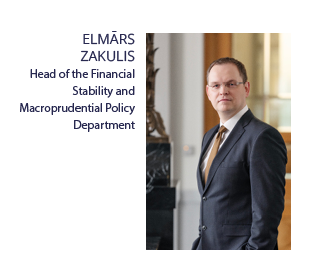
"Since 2023, Latvijas Banka determines and implements macro-prudential policy, including applying macro-prudential policy instruments to strengthen the resilience of the financial system against shocks and limit the formation of systemic risks. The explicitly defined macro-prudential policy mandate in the Law on Latvijas Banka and the synergy between the macro-level and micro-level competences will enable the implementation of macro-prudential policy even more effectively."
As of 2023, when Latvijas Banka took over the functions of macroprudential policy, the Financial Stability Department was reorganised. It was renamed the Financial Stability and Macroprudential Policy Department, and it has two divisions – the Financial Stability Analysis Division and the Macroprudential Policy Division. The Macroprudential Policy Division will perform macroprudential functions, including preparing of macroprudential decisions and acts regulating macroprudential requirements.
International cooperation
In 2022, Latvijas Banka contributed to the work of the Nordic-Baltic Stability Group (a cooperation group bringing together central banks, supervisory and resolution authorities and ministries of finance of the Nordic and Baltic countries for the purpose of cross-border crises coordination, information exchange and its generation). Latvia was the presiding country of the group in 2022. In view of the conclusions drawn from the financial crisis exercises carried out in previous years, three subflows of work were created in this group where Latvijas Banka: 1) managed the implementation of secure information exchange between participants; 2) coordinated identification of legal obstacles to the exchange of information with regard to the functions and institutions involved in crisis in Latvia; 3) the preparation of the next crisis exercise. Latvijas Banka also continued to be an active participant of the macroprudential forum of the Nordic and Baltic countries and of the cooperation framework of central banks regarding cross-border financial institutions.
In 2022, experts of Latvijas Banka contributed to an article The 2008 financial crisis in the Baltic States by the Financial Stability Institute of the Bank for International Settlements, which added to the series of articles on bank crisis management.
Latvijas Banka took an active part in the Nordic and Baltic technical assistance project “Analysis of financial flows and AML/CFT supervision” implemented by the IMF, providing advice on the improvement of the assessment methodology and ensuring data for a proper assessment.
Latvijas Banka contributed to the assessment of systemic risks to financial stability and of macroprudential policy in the euro area by participating in the work of the Financial Stability Committee (consisting of representatives of the ECB and central banks and supervisory authorities of the Banking Union countries) and its subgroups, as well as engaged in the work of the Advisory Technical Committee of the European Systemic Risk Board (ESRB) and its working groups, and contributed to drafting policy and analysis documents and defining opinion at EU level.
Research and publications
In 2022, Latvijas Banka made an in-depth assessment of borrowers’ vulnerability against the backdrop of inflation and rising interest rates. The results of the analysis were published on the website makroekonomika.lv and discussed at public expert discussions organised by Latvijas Banka, as well as presented at the financial stability working group of the Nordic-Baltic central banks.
Significant work continued in the area of financial system sustainability analysis. By combining climate forecasts, data on companies’ finances and geospatial data of companies’ structural units, a study on the impact of climate change physical risks on Latvian businesses was carried out. It showed that companies› future activities will be affected by more intense precipitation and floods risks. The risks posed by heat in cities where business activity is concentrated should be particularly emphasised. An assessment of physical (natural disasters) risks from climate change was also carried out, dedicating several series of articles to this topic on the website makroekonomika.lv. The main risks stem from floods, but storm risks are also significant, and insurers play a vital role in mitigating and transferring these risks. The theme of housing sustainability was also analysed. The results of the analysis of the gains from energy efficiency of buildings, costs and problems hampering a more active renovation process, as well as reasoning for prompter political action were discussed at the LAMPA Conversation Festival.
The raising of public awareness about cyber security risks and developments in the field of crypto-assets continued. These topics will remain important in the future as well – although no critical cyber incidents have been detected in Latvia, the activity of attackers has grown, and it is possible to insure against cyber risks risks. The volumes of crypto-asset payments in Latvia are increasing therefore the risks related to crypto- assets should be monitored in the future.
Latvijas Banka continued to analyse vulnerability of the real estate market by enhancing a range of data available in the Credit Register of Latvijas Banka and devising solutions for the assessment of borrowers’ vulnerability and the resulting risks to the financial sector, using the data provided by the Credit Register and other state registers (for example, the State Land Service and the Enterprise Register of the Republic of Latvia), as well as the State Revenue Service. An analysis tool was also created, which automatically collects the real estate advertisement data published on the internet, thus making it possible to obtain information describing market activity and the price level.
Cooperation with public institutions
In 2022, one meeting of the Macroprudential Council was held, where representatives of Latvijas Banka, FCMC and the Ministry of Finance discussed the systemic risks of financial stability and the need to implement macroprudential measures to limit them. Taking into account the integration of the FCMC into Latvijas Banka, the agreement between Latvijas Banka, the FCMC and the Ministry of Finance on cooperation in promoting financial stability was revised accordingly, providing that Latvijas Banka and the Ministry of Finance continue to cooperate within the Macroprudential Council.
Latvijas Banka continued its cooperation with the public institutions of the Republic of Latvia on AML/CFT, proliferation and sanctions: to improve the legal framework, develop and maintain Latvia’s position on EU AML/CFT action, prepare a public summary of the national AML/CFT risk assessment report and participate in the Baltic-Nordic regional AML technical assistance project.
In 2022, by providing advice to the Ministry of Finance, Latvijas Banka continued to engage actively in the preparation of Latvia’s position on the European Commission’s legislative proposals for strengthening the AML/CFT and proliferation framework, including the possible location of the new EU Anti-Money Laundering Agency (AMLA) in Riga.
During 2022, the importance and development of the 2nd pillar pension funds, potential amendments to the Law on State-funded Pensions and their impact on Latvia’s economy was discussed with representatives of the Finance Latvia Association and public institutions.
Through the cooperation of Latvijas Banka and the legislator with the Finance Latvia Association, the cancellation of mortgage debts during the crisis was implemented. Hopeless irrecoverable debts in the amount of at least 158 million euro were written off, helping at least 3250 borrowers and their guarantors to address their loan problems and return to the economy.
In 2022, Latvijas Banka developed proposals for the improvement of the housing guarantee programme of AS Attīstības finanšu institūcija Altum, which were published in the Financial Stability Report 2022 and presented at the discussion on lending in Latvia organised by the Finance Latvia Association.










